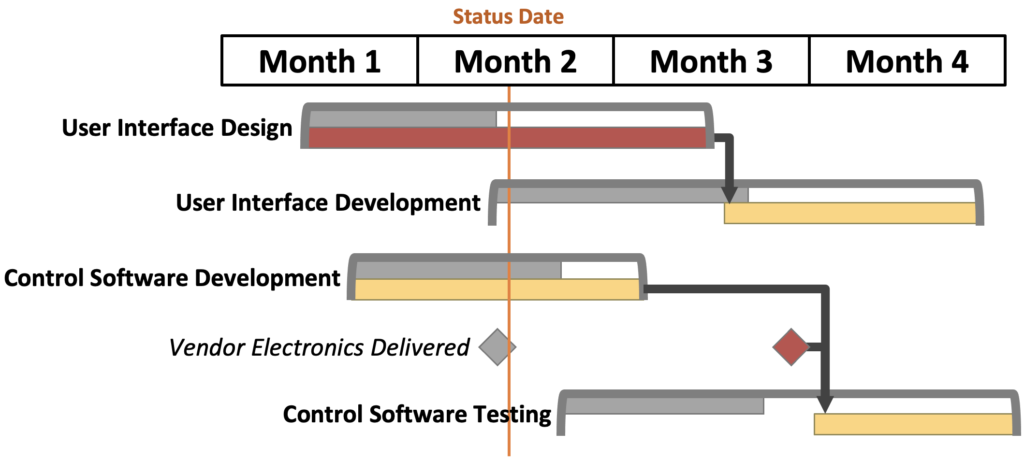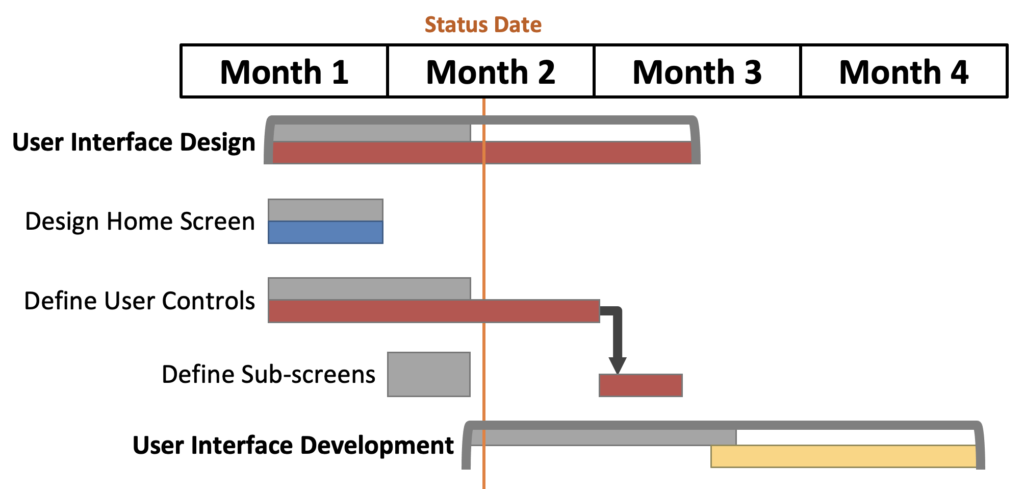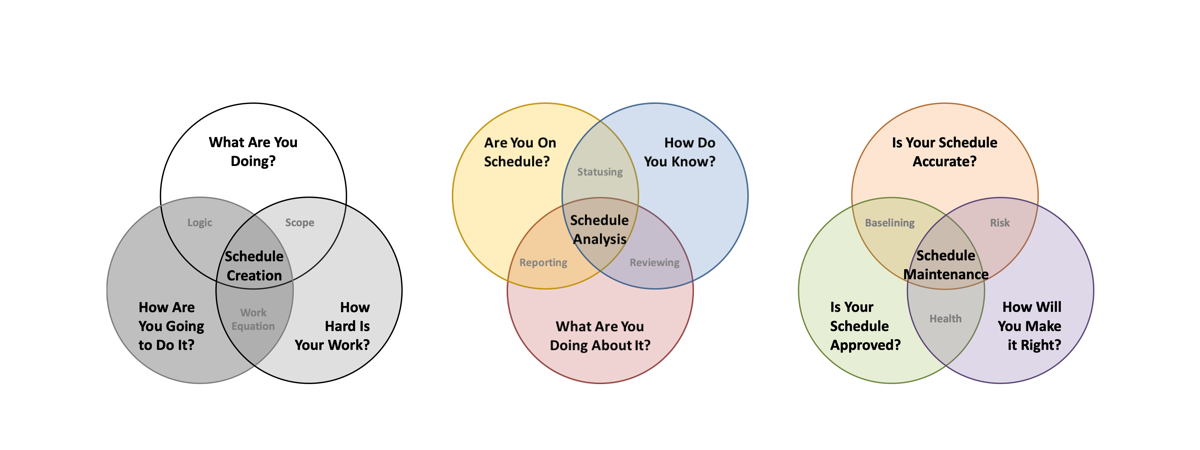One-on-one schedule review meetings can save a project. They help team leads find problems they didn’t even realize were brewing. Crises can be downgraded to hassles thanks to the schedule’s ability to remove the element of surprise. But anything that can do high levels of good can also cause damage when mishandled.
This article will discuss the unusual relationship between Schedule Managers and team leads, how schedule review meetings conducted with the highest level of trust and professionalism answer schedule analysis’s “Big Three” questions, and how schedule reviews can open new lines of communication.
Relationship Between Schedule Manager and Team Lead
Most managers draw their authority and responsibility from the project’s organizational structure. Program managers oversee project managers or team leads who oversee team members. Schedule Managers, draw their authority from ownership of the schedule file and the organization’s Schedule Management processes.
This functional authority, or subject matter authority builds a creative tension with the project manager’s area of responsibility and purpose. Figure 28 shows some of forces at work during manager reviews. If the tension is permitted to become acrimonious, it will be hard to resolve the schedule. Managers often seek to resolve conflict with compromise, but compromising on schedule leads to a compromised schedule. Meetings that stay constructive lead to collaboration on the Schedule Manager’s and the project manager’s shared goal of completing the project as closely according to plan as possible. The manager review meeting’s outcome largely depends on the Schedule Manager’s hosting of the meeting. To that end, Schedule Managers have several approaches at their disposal.

Confidentiality
Schedule Managers must build the same reputation for safeguarding secrets as attorneys and doctors who are legally bound to protect their clients. Confidentiality is perhaps the most important soft skill a Schedule Manager can develop. Once trust is earned, schedule review meetings, especially one-on-ones, become an extraordinary source of knowledge about how the project is going. That intel, when appropriately used, can rescue a project from failure’s brink.
Believing the Schedule
History is rife with strategic thinkers who ignored their own predictions because the conclusions were inconvenient. Hundreds of hours have been spent building and maintaining the current schedule so that it is ready today to answer schedule analysis’s first big question. So, when the schedule says that the project will run late, then the project will run late. If a manager or a team lead refutes the schedule, they need hard evidence to support their claim. This is the second big question.
But delays don’t need to be accepted or rejected. They can be fixed. This is the third big question, and only team leaders can answer it. In fact, answering “What are you going to do about it?” is the manager’s most critical contribution to the schedule every week. The Schedule Manager can help team leads by finding options and making their choices clear.

Problem Solving and Pressure
David Maister’s “The Trusted Advisor”, Dale Carnegie’s “How to Win Friends and Influence People”, and many other business books offer excellent advice for getting the most out of business relationships with colleagues. These essential soft skills support the rigorous logic and problem solving needed to troubleshoot the schedule every week. Consider the scenario depicted by Figure 29 showing software development activities which have encountered delays.
The software development team and the end user have been struggling to design the system’s user interface. Developing the control software is taking longer than expected, but the developers are confident their finish date will not slip further. This week’s surprise was the hardware vendor announcing a day before their expected delivery that the hardware is on backorder for another six weeks.

It’s easy to look at the schedule shifts and proclaim the project is going badly. But not going well, and not going as planned are very different statements. How can the Schedule Manager help the project team regain control?
Begin with the soft skills. Many managers, regardless of work culture, would feel pressure to “fix” the schedule with some brilliant yet obvious trick of project management. (The business world assumes “Hail Mary” plays will work 100% of the time.) Whether the manager and their team deserve credit for the delays, they can create options to lessen the impact. The schedule is an excellent tool for figuring out where the least amount of effort will bring the most benefit.
Returning to Figure 29, compressing the Control Software Development activity is not going to improve the schedule since the external vendor milestone is the driving task. The project manager may be able to bargain with the vendor to expedite a partial delivery to support testing. But if that is not a realistic option, the best opportunity for reducing pressure on the schedule is to address the runaway user interface design.
In an actual schedule review (unconstrained by page size) the expanded summary activities would show right away that Define User Controls is causing multiple delays. Not only has the effort extended to twice the duration, but Define Sub-screens is now a successor task which was previously not the case. The key to at least partially recovering the schedule lies here.

Opening Lines of Communication
Trick question: How does a Schedule Manager share project saving secrets learned in confidence? They don’t. But the schedule doesn’t keep secrets. What is written in the schedule must be accurate, and knowable to everyone entrusted to work on the project.1It does not go without saying that schedule information is extremely sensitive to even mundane projects. But schedule data has a much broader need to know base than many other sources of project intel.
Team Leads and managers in a competitive work environment have excellent reasons for not sharing their skeletons with the world. The schedule gives teams a way to talk in detail about things they might not otherwise freely discuss.

The Development team in Figure 31 wouldn’t want to share that they completely misunderstood the requirements of a new feature and must start over. But doubling the relevant efforts and durations tells the Testing team what they need to know. An unexpected staffing shortage at the Testing Company means that the geospatial specialist is only available to support testing for a couple weeks. The Development Company doesn’t need to see their competitor’s dirty laundry, but constraint dates, and detailed schedule logic will inform the Requirements and Development teams when they need to have the geospatial component of their design ready for testing.

Conveying critical information without leaking the sensitive details behind them takes care and practice. But as the schedule and Schedule Manager become trusted conduits of information, team leads will grow more willing to share valuable intel which can steer the direction of the project. Be sure to exploit this to further communication.
For example, at the end of a one-on-one review meeting, imagine asking the team lead the following. “Besides what’s in the schedule, is there any context you want me to share with the Testing Team, or the Requirements Team?” The team lead will likely decline the invitation the first several times it is offered. But wrapping up a review with this question opens the door for communication without applying pressure.
Next Steps
Like any “good” meeting, a good schedule review doesn’t just happen. It required preparation. Schedule Reviewing Fundamentals introduced the initial ideas for how to conduct individual and manager reviews. Schedule Reviewing Techniques will delve much deeper into preparing and conducting reviews swiftly and effectively.
